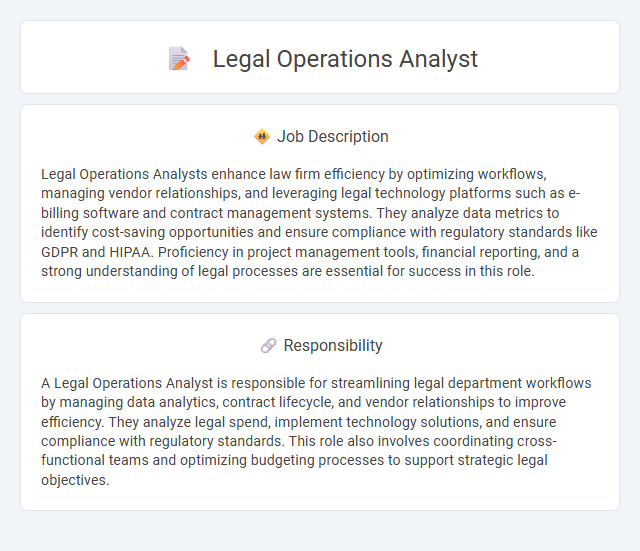
Legal Operations Analysts enhance law firm efficiency by optimizing workflows, managing vendor relationships, and leveraging legal technology platforms such as e-billing software and contract management systems. They analyze data metrics to identify cost-saving opportunities and ensure compliance with regulatory standards like GDPR and HIPAA. Proficiency in project management tools, financial reporting, and a strong understanding of legal processes are essential for success in this role.
Individuals with strong analytical skills and a detail-oriented mindset are likely to be suitable for the Legal Operations Analyst role, as it demands managing complex data and optimizing legal processes. People who thrive in structured environments and possess effective communication abilities may have a higher probability of success in this position. Candidates comfortable working under pressure and adapting to evolving legal frameworks might find the job particularly fitting for their skill set.
Qualification
A Legal Operations Analyst typically requires a bachelor's degree in law, business administration, or a related field, combined with experience in legal project management and process improvement. Proficiency in legal software systems such as contract management, e-billing, and document automation tools is essential. Strong analytical skills, knowledge of compliance regulations, and the ability to optimize legal workflows are critical qualifications for this role.
Responsibility
A Legal Operations Analyst is responsible for streamlining legal department workflows by managing data analytics, contract lifecycle, and vendor relationships to improve efficiency. They analyze legal spend, implement technology solutions, and ensure compliance with regulatory standards. This role also involves coordinating cross-functional teams and optimizing budgeting processes to support strategic legal objectives.
Benefit
Legal Operations Analyst roles likely offer significant benefits by improving efficiency and cost-effectiveness in legal departments. Enhanced data analysis and process optimization may lead to more strategic decision-making and resource allocation. This could result in measurable gains in both productivity and financial savings for legal teams.
Challenge
The role of a Legal Operations Analyst likely involves navigating the complexity of managing legal workflows and optimizing operational efficiency in a highly regulated environment. Challenges may arise from integrating new technologies with existing legal management systems while ensuring compliance and data security. There is probable pressure to balance cost control with the need for accurate and timely legal support, requiring continuous adaptation to evolving legal and business demands.
Career Advancement
Legal Operations Analysts drive efficiency and innovation within corporate legal departments by streamlining processes and managing technology solutions. Mastery in data analytics, project management, and legal technology platforms significantly enhances career advancement opportunities. Professionals who continuously develop strategic planning skills and cross-functional collaboration experience faster promotion to senior roles such as Legal Operations Manager or Director.
 kuljobs.com
kuljobs.com